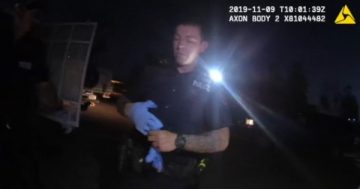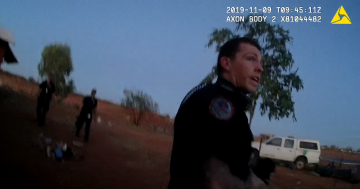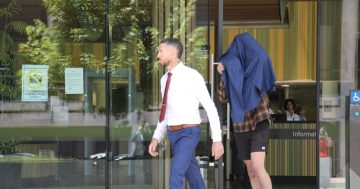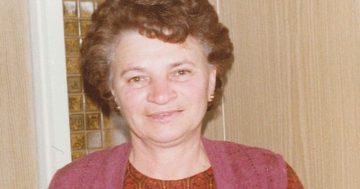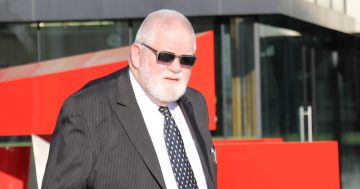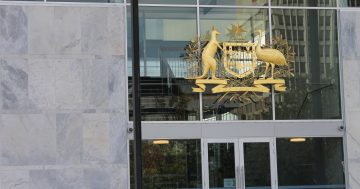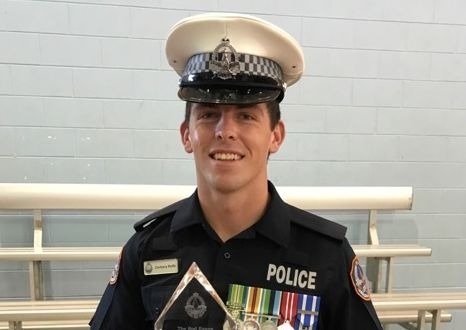
Zachary Rolfe is facing a trial in the NT Supreme Court where he is accused of murdering Kumanjayi Walker. Photo: File.
Chaotic and distressing footage has been played to a court allegedly showing police officer Zachary Rolfe shooting Indigenous Australian Kumanjayi Walker in a “double-tap” while he was pinned underneath another cop.
The jury trial of 30-year-old Mr Rolfe, accused of murdering 19-year-old Mr Walker while he was being arrested in the small community of Yuendumu, began in the Northern Territory Supreme Court on Monday (7 February).
A compilation of body-camera footage from officers who went to the house where Mr Walker was found was shown to jurors during Crown Prosecutor Philip Strickland SC’s opening submissions, which he warned was “confronting”.
Mr Rolfe and the others could be heard looking for Mr Walker. After they apparently found him, the recording – which many journalists were only able to access as an audio stream – descended into chaos, with shots, shouts and screams followed by the sounds of a man moaning.
“He’s got scissors here. He was stabbing me, he was stabbing me,” a person yells at one point.
Mr Strickland told jurors Mr Rolfe and four other officers arrived at Yuendumu at about 7 pm on 9 November 2019, and he and one other went to the house to arrest Mr Walker shortly afterwards.
But it was alleged about a minute after he entered the home, Mr Rolfe shot Mr Walker three times with a semi-automatic Glock pistol.
Mr Strickland said Mr Walker was holding a 10 cm pair of medical scissors when he got into a struggle with the other officer.
He alleged Mr Rolfe was standing one metre away when he shot Mr Walker and hit him in the middle of his back – a shot that did not kill him and is not the subject of any charges.
Mr Strickland alleged Mr Walker fell or was wrestled to the ground by the other officer, a person physically larger than him, who pressed him down onto a mattress with his body.
While Mr Walker still held the scissors, the prosecutor argued this arm was pinned under his body at the time.
Mr Strickland alleged 2.6 seconds after firing the first shot, Mr Rolfe “stood over” Mr Walker while he was “pinned down” and fired again, this time into his left torso.
Then, about 0.5 seconds after the second shot, he said Mr Rolfe fired a third time into Mr Walker’s mid-region.
“The Crown case is that the accused deliberately fired the three shots at Kumanjayi Walker, the last two at point-blank range,” Mr Strickland alleged.
“This rapid discharge of shots with a semi-automatic gun is sometimes called a ‘double-tap’ in police and military circles, and the ‘double-tap’ is designed to ensure maximum injury or death.”
He alleged the last two shots had been fired when Mr Walker was on the ground and “effectively restrained”.
Mr Rolfe, who had been in the Australian Defence Force and served overseas, including in Afghanistan before joining the NT Police in 2016, had extensive experience handling firearms, but limited experience performing police duties in an Indigenous community, Mr Strickland said.
The court heard police were searching for Mr Walker because he had breached a court order requiring him to live at an alcohol rehabilitation centre in Alice Springs by going back to Yuendumu, which was three hours’ drive away, because he wanted to go to his great-uncle’s funeral.
Two officers with considerable experience in policing Indigenous communities found him at a home on 6 November 2019. Mr Strickland said he expected the evidence would be that this time he had been seen with an axe before dropping it and fleeing.
Mr Strickland said neither of the officers drew their guns during this so-called “axe incident”.
“I don’t think he wanted to chop us up; he just wanted to escape. No one was injured and that’s the best result in my view,” one of these officers said after the incident.
Mr Strickland told jurors the central issue was whether Mr Rolfe’s conduct was “legally justified” and he would not be held criminally responsible if his conduct was found to be so.
He anticipated three defences would be put forwards: self-defence, that he was acting in his duties as a police officer and his conduct was reasonable, and that he was acting in good faith.
Mr Rolfe pleaded not guilty to a charge of murder, as well as alternative charges of manslaughter and committing a violent act causing death.
The trial is expected to last for four weeks before Justice John Burns.












